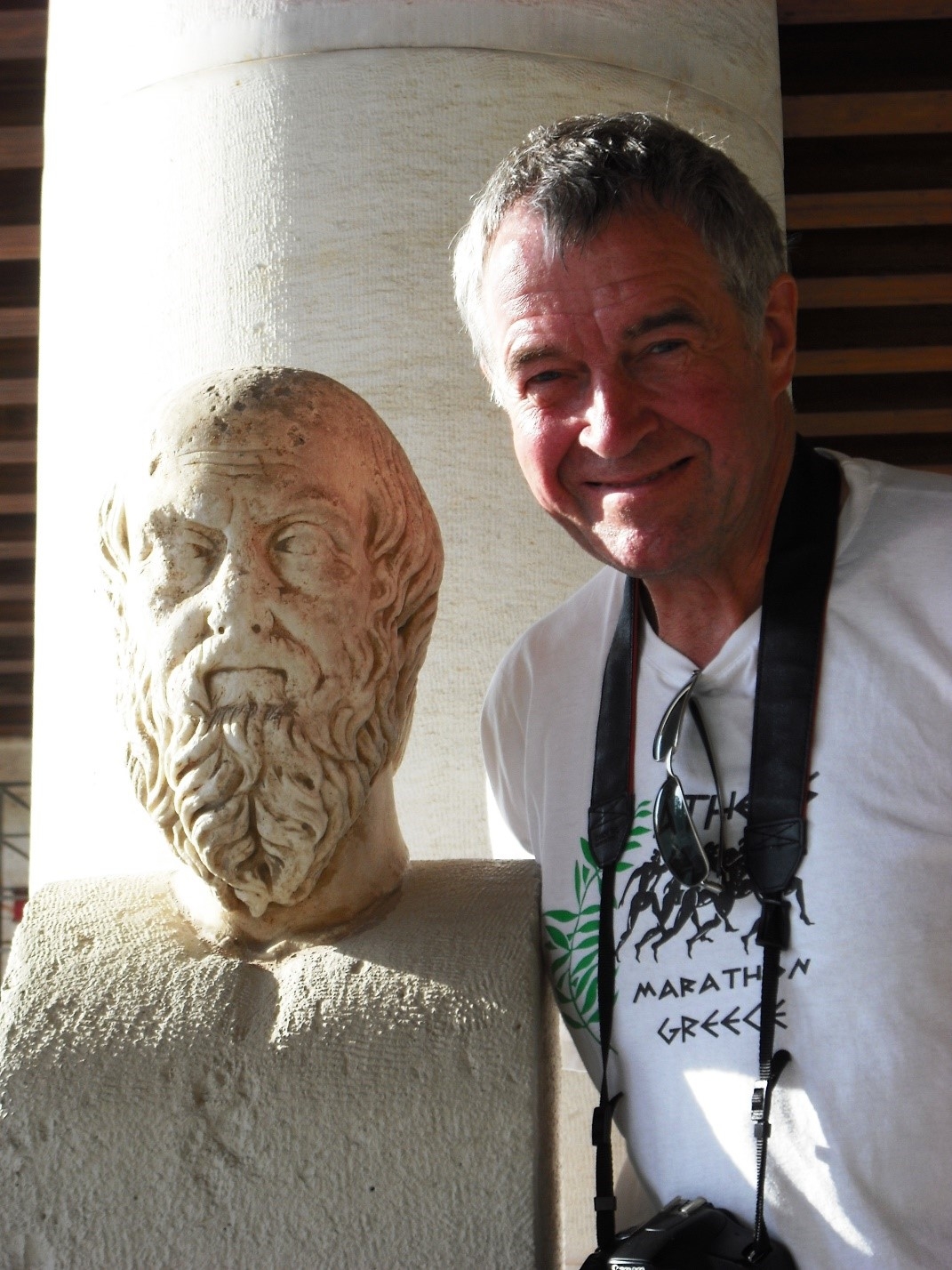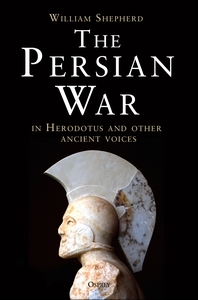William Shepherd rejoins us on the blog and introduces his latest book, The Persian War in Herodotus and Other Ancient Voices.
The Persian War is the name generally given to the first two decades of the period of conflict between the Greeks and the Persians that began in 499 BC and ended around 450. But in 480 and 479 a massive Persian invasion force was defeated and driven out of mainland Greece and Europe, never to return.
When they had gathered together all the spoils, the Greeks put one tenth aside for dedication to the god at Delphi. With this they set up the golden tripod resting on a bronze triple-headed serpent that is to be found very close to the altar.
(Herodotus Historia 9.81)

The remains of the Serpent Column in Istanbul. Minarets added to the 6th-century Christian basilica of Hagia Sophia in the 15th and 16th centuries can be seen to the right of the Obelisk of Theodosius, which was erected in the 4th century. (Wikimedia/Gryffindor/Public Domain)
This ‘Serpent Column’ was seven or eight metres tall and crowned with a golden dish for sacrificial offerings to Apollo, its dedicatee. On its shaft were engraved the names of 31 city states or peoples that had fought the Persians, one of the very few contemporary inscriptions to have survived as evidence of the war. The golden dish survived until only half-way through the following century, but, in the 4th century AD, Constantine the Great, Roman Emperor of the West and East, brought the column to Byzantium, the crossing point between Europe and Asia. The serpents (actually three of them, not one with three heads) were decapitated, allegedly by a drunken Mameluk soldier during the Ottoman era, but the twisted column still stands in the Hippodrome of Constantine, now Istanbul’s Sultanahmet Square. Beyond, reliefs at the base of a commemorative column show Theodosius I in his pomp as Emperor of the East in the late 4th century. The great basilica of Agia Sophia with its four minarets towers behind, and the Sultanahmet ‘Blue’ Mosque is close by. These are massive symbols of the glories of Greece, Rome, Christianity and Islam.

The Serpent Column was still intact in the late 16th century, as depicted in Surname-i Vehbi, a collection of Ottoman miniatures.
(Wikimedia/Bilkent University/Public Domain)
‘Alternate history’ is often little more than an entertaining game, but here the what-if questions are profound. If the Greeks had lost the Persian War in 479, would there have been the same golden flowering of Athenian culture and institutions in the decades that followed? If Greece had become part of a Persian Empire with southern Italy now on its frontier, would Rome (that had turned republican at about the same time as the Athenians were taking their first steps towards democracy) have been allowed to grow into the world power that Constantine ruled? If not, what of Christianity? Without the bloodstream of the Roman Empire’s communications network to sustain its growth, Christianity might never have spread to become a world religion and the catalyst that brought another, Islam, into being. A Persian victory would have changed much more than the scenery at the centre of the site of ancient Byzantium. It could have profoundly redirected the subsequent evolution of the cultural, intellectual, political and religious landscapes of Europe and the Middle East.
The many modern accounts of the Persian War generally include numerous references to what the ancient authors wrote about it, but directly quote from them only a little. Herodotus is by far the most substantial and important source to have survived and my book is built around his entire narrative of the conflict with extracts interwoven from the other ancient sources. It brings together translations of the original texts that tell us almost all that can be known about this immense clash of arms and the events that led up to it.
These ancient voices speak for themselves and powerfully communicate the intensity and epic drama of ‘the great and marvellous deeds’ that culminated gloriously in Greek victory on land and sea. But they do raise questions in the minds of 21st-century readers who come to the text with knowledge and expectations very different from those brought to it by the writers’ contemporary audiences, who would mostly have been unconcerned by issues of omission, incompleteness, vagueness, bias or exaggeration that may exercise us now. I address such issues as these as they arise in my commentary on the ancient texts and make the case where necessary for my preferred interpretations. Any interpretation or amplification must take the written evidence that is gathered together in this book as its baseline; there is little else.
The translations are my own, and translation and interpretation go hand in hand. My aim has been to produce versions that are readable and also linguistically accurate (which all translations, as opposed to adaptations, need to be) with a consistent focus on the military-historical content and the language in which it is presented. At the same time, I hope I have succeeded in conveying something of the character and style of the more extensively quoted authors. They have a glorious story to tell and retell, and the process of mining their texts for military history should not be allowed to prevent us from enjoying them at this level.

Conversations in the Agora, Athens with my principal source. (© William Shepherd)
The Persian War in Herodotus and Other Ancient Voices is out now. Order your copy here!


Comments
You must be logged in to comment on this post. Click here to log in.
Submit your comment